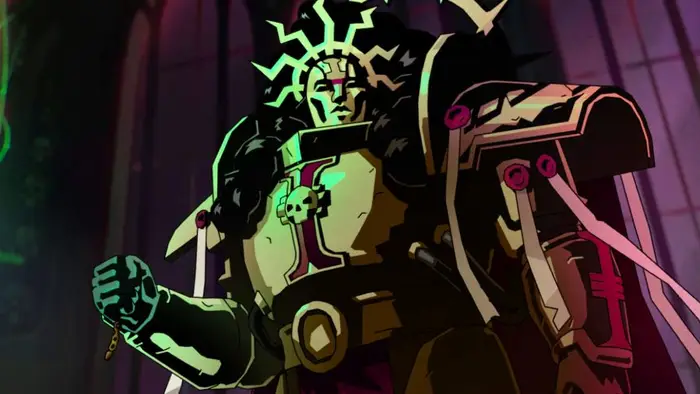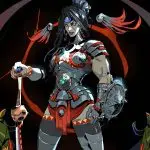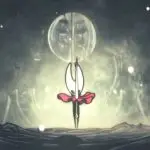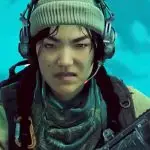Once upon a time I read a very short introduction to the devil. I have always been fascinated by the occult, especially the dark, the devil, the boring stuff. I was drawn to vampires: masquerade allows you to live a supernatural power fantasy because of your ability to challenge your morals. But in each of them – even in VTM – it feels like there’s a good guy. Someone who is slightly better than others.
In Warhammer 40K, there is simply no clear line between heroes and villains. The game workshop offers a power fantasy of giant armor and explosive weapons, but it doesn’t give you the opportunity to be truly good. As my book on the devil told me, most people resist the voices at the back of their heads and urge them to do something bad. It is a juxtaposition owlcat explored alongside the rogue trader, a concept that we need to tackle with the latest crack of making one of the studio’s latest RPGs. Warhammer 40K: Dark Heresy.
Rogue Traders cast you as the central ties of a vast space opera. It’s obvious that you’re in charge as you’ve been promoted to an eponymous role. In contrast, in the dark heresy, you play as an inquisitor, people who get the shit out there. There’s nothing wrong with fanfare or right. There is something the emperor says, then there is heresy. It takes a little time to grab my head around those binaries. There are 50 shades of blood, but our goal is simple and united, and no one is questioning it.
“Traditional stories come with a set of pre-determined things of good and evil,” executive producer Anatoly Söstoff tells me. “For someone to do these things before you decide that your integrity will shift to the good or evil side, and the world will respond accordingly. What about Warhammer is that no one really understands because these things are intertwined. what It’s good what bad. We are talking about you not choosing between good and evil, it’s you Decided What’s good, what’s bad – killing these innocent people may be good at this particular moment. Perhaps punishing this bad person might be evil.

Schestov plays through early sections of the game, and the mechanics immediately reminiscent of a sister RPG, but the scale just feels big. Both the environment and animation certainly have a glow, with local settlements pulling my heart and scribbles of people who are bringing the world to truly miserable lives. The caves feel echoes and have enough vertical depth to present a challenging combat encounter.
But for me, the main difference I see between a rogue trader and its new dark sisters is focusing on the work of detectives. It’s like La Noire and I don’t want no one to die. You shake up the scenes of the crime and check every corner, but Schestov says you are “Arnold Schwarzenegger more than Sherlock Holmes” because you need to break things down to reveal details of Nitty’s gritty. As someone who loves detective stories (I’m going to die on the hilltop that La Noir is the biggest video game ever made), this is music to my ears.
“The system itself doesn’t require you to play as a detective,” Shestoff tells me. “It happens naturally narratively. We have realized that the detective aspect of things allows us to talk to players on another level. It doesn’t just give you facts. You can read them. It’s not just personal feelings. You can read them.

But as Shestoff says, most of your time is spent “breaking” things. The Warhammer 40K is its heart, a story of destruction, with combat at its heart very important. Based on the traditional turn-based system seen in Rogue Trader, Dark Heresy adds a fallout-esque targeting system and lets you specify which limbs you want to blow. You can brush your arms, legs, head, torso, neck, and even your eyes. Each has a percentage of chances to land a shot. Diving a few rounds into an enemy’s arm can cause serious injuries and potentially advance. It’s yet another layer of strategy and I absolutely love it.
The battle scenario has also been leveled up. It is probably inspired by the gates of Larian’s Titanic Baldour. You can go stealth or unleash absolute hell, but we intoxicate the bandits and attack them, giving them a series of debuffs. Again, how do you approach each major skirmish and add more layers to the already complicated battle.
I can’t see the perfect fight, but things work just like rogue traders – everything is turn-based, with different party members bringing capabilities to the table. The cover system is still there, but it feels like everything is leveling up. Bar brawls are always fun, but I look forward to seeing what the bigger and boss fight sequences look like.

Schestov describes the dark heresy as “the fruit of Ouracat’s passion and labor,” and from an hour after seeing him play, it really comes across. It’s bigger, bolder, more complicated than its predecessor, and the only CRPG I’ve seen in the post-Baldur Gate 3 era, and I think I could approach the Larian epic. Of course, it’s a Warhammer 40K game, which may be uncomfortable for some, but if you love story-driven adventures and make difficult life and death decisions, I really believe Darkery is the game for you.
“We are still ambitious as fuck and crazy people and we are making games that we want to play,” Shestoff tells me with a smile. I can’t wait to get my bloody legs in a dark heresy, but in the meantime I’ll probably go back to Rogue Trader and check out Rex Imperious DLC. Perhaps in the spirit of becoming an inquisitor, I will once have the little voice behind my head in charge – after all, the Emperor’s words are law. Am I asking that?








